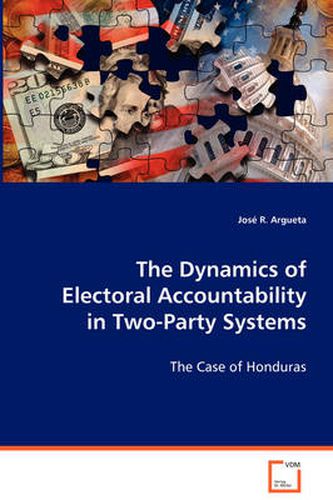Readings Newsletter
Become a Readings Member to make your shopping experience even easier.
Sign in or sign up for free!
You’re not far away from qualifying for FREE standard shipping within Australia
You’ve qualified for FREE standard shipping within Australia
The cart is loading…






This title is printed to order. This book may have been self-published. If so, we cannot guarantee the quality of the content. In the main most books will have gone through the editing process however some may not. We therefore suggest that you be aware of this before ordering this book. If in doubt check either the author or publisher’s details as we are unable to accept any returns unless they are faulty. Please contact us if you have any questions.
It has been argued that strong national parties, with somewhat deep roots in the society, are necessary for electoral accountability. In such settings, citizens with varying combinations of societal characteristics would be better able to identify which party represents their cleavage-generated interests and vote for them, or vote them out of office if they fail their mandate. However, cleavage-based partisans are much more likely to develop a strong, affective attachment to their party. Because of that, they would also be more inclined to vote for the same party election after election. For electoral accountability to occur, a considerable segment of the electorate must be composed of independents and moderate partisans, without any strong, affective attachment to a party. This research found that the mechanisms through which electoral accountability came about were mainly independents voting for different parties in subsequent elections and moderate partisans abstaining from voting for their party. Thus, voting abstention may not necessarily be an undesirable voting behavior, nor should independents be overlooked, since they might actually decide the winners of elections.
$9.00 standard shipping within Australia
FREE standard shipping within Australia for orders over $100.00
Express & International shipping calculated at checkout
This title is printed to order. This book may have been self-published. If so, we cannot guarantee the quality of the content. In the main most books will have gone through the editing process however some may not. We therefore suggest that you be aware of this before ordering this book. If in doubt check either the author or publisher’s details as we are unable to accept any returns unless they are faulty. Please contact us if you have any questions.
It has been argued that strong national parties, with somewhat deep roots in the society, are necessary for electoral accountability. In such settings, citizens with varying combinations of societal characteristics would be better able to identify which party represents their cleavage-generated interests and vote for them, or vote them out of office if they fail their mandate. However, cleavage-based partisans are much more likely to develop a strong, affective attachment to their party. Because of that, they would also be more inclined to vote for the same party election after election. For electoral accountability to occur, a considerable segment of the electorate must be composed of independents and moderate partisans, without any strong, affective attachment to a party. This research found that the mechanisms through which electoral accountability came about were mainly independents voting for different parties in subsequent elections and moderate partisans abstaining from voting for their party. Thus, voting abstention may not necessarily be an undesirable voting behavior, nor should independents be overlooked, since they might actually decide the winners of elections.